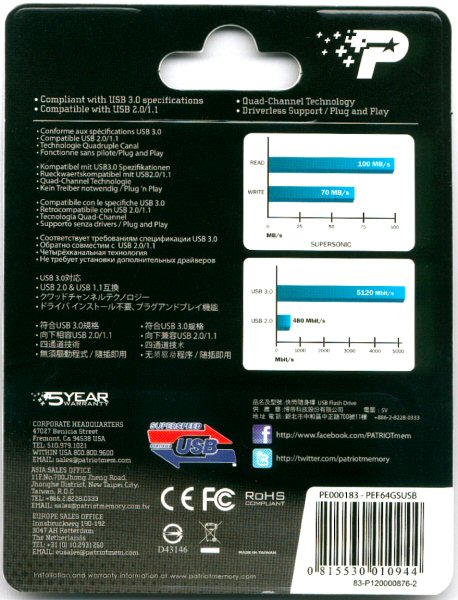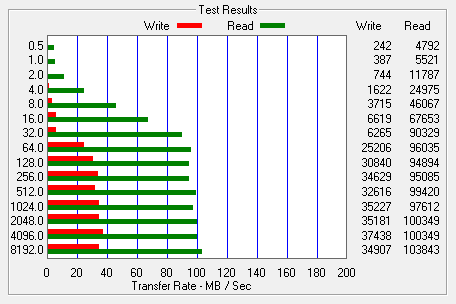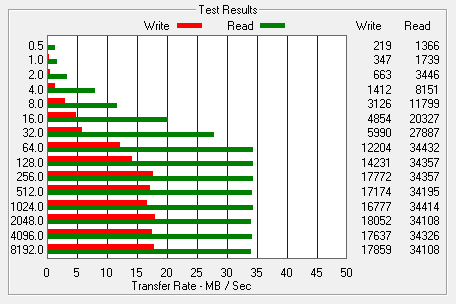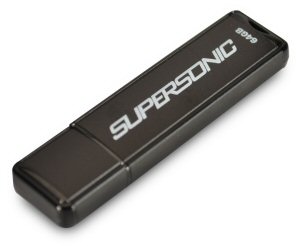

Model: Patriot Supersonic USB 3.0 Flash Drive
Manufacturer: Patriot Memory
Provided By: Patriot Memory
Among computer enthusiasts the name Patriot is synonymous with quality and value. Founded in 1985, this California-based company has established itself as a leader in the industry by delivering high quality memory solutions powered by the latest technology. Along with a full range of memory modules for desktops, laptops and servers, Patriot offers an assortment of flash-based data storage products including memory cards, solid state drives (SSDs) and USB flash drives.
One of the latest additions to Patriot's line of USB flash drives is the Supersonic. Available in 32GB and 64GB capacities, the Supersonic combines a single-chip USB 3.0 flash memory controller with Quad-Channel technology. As a result, the drive is capable of delivering up to 100MB/s sequential read and 70MB/s sequential write speeds. The Supersonic also features a durable aluminum enclosure that enables shock resistance up to 15Gs to ensure greater protection of your data. To top it all off, Patriot backs the drive with a five-year warranty.
| Patriot Supersonic USB 3.0 Flash Drive | |||||||||||||
General Specifications
Performance
Other Features
|
Needless to say, this is only a taste of what the Supersonic has to offer. To give you an idea of what to expect, we'll take a closer look at Patriot's USB 3.0 flash drive and then see how well it performs. Does the Supersonic have what it takes? Keep reading as we find out.
Packaging:
The Supersonic comes packaged in a cardboard blister pack. The front of the card advertises the drive's capacity, rated speeds and key features including its quad-channel technology and USB 3.0 interface. On the back, Patriot has provided a few graphs showing the Supersonic's maximum read and write speeds as well as the difference in performance between USB 3.0 and USB 2.0.
Physical Features:
While not the largest flash drive in Patriot's lineup, the Supersonic definitely isn't the smallest either. Measuring 2.83" (7.2cm) long, 0.75" (1.92cm) wide and 0.33" (.85cm) thick, it's about the size of a pack of gum.

The Supersonic is well constructed and has a very solid feel to it. The body of the drive is made out of aluminum which, according to Patriot, is shock resistant up to 15Gs. The Supersonic also uses an aluminum and plastic cap to protect its USB connector. While it stays on pretty well, it cannot be stored on the opposite end when the drive is in use.

On the end of the Supersonic there is a loop where you can attach the drive to your key ring. While you can't see it in these pictures, there is an LED inside of this loop that lights up red whenever the drive is transmitting or receiving data or is in the identification process.
Installation:
As with most USB flash drives, the Patriot Supersonic was very easy to install. Those running Windows XP, Vista or 7 can simply plug the drive into any available USB 2.0 or 3.0 port on their computer. If the computer is already turned on, plug and play will automatically detect the drive.
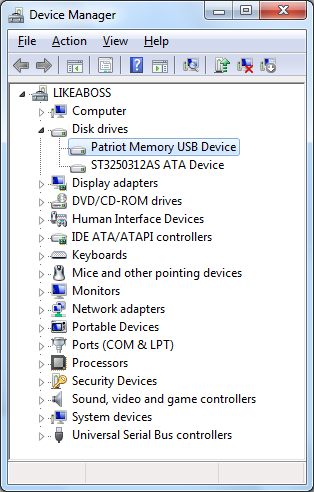
If installed correctly, the Supersonic should show up in the Device Manager. Under Windows 7, the drive is identified as a "Patriot Memory USB Device".
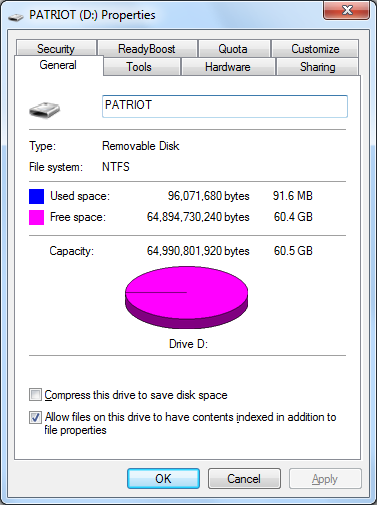
The Supersonic comes formatted with NTFS, giving the 64GB model about 60.4GB of usable space.
Performance:
The test system used in this review was an HP 8200 Elite. The computer came equipped with an Intel Core i5-2400 CPU, 4GB of DDR3 1333MHz memory, Seagate Barracuda 7200.12 ST3250312AS 250GB SATA 6 Gb/s hard drive, NVIDIA Quadro FX580 512MB PCIe graphics card, Intel 82567LM-3 gigabit network card and Patriot SuperSpeed USB PCIe host card. For the operating system, I installed a fresh copy of Windows 7 Enterprise.
To test the performance of the SanDisk Ultra, I ran a series of benchmarks using CrystalDiskMark 3.0.1, HD Tach RW 3.0.4.0, ATTO Disk Benchmark 2.46 and SiSoftware Sandra Lite 2010.SP2. To get a feel for the "real world" performance, I also copied and pasted 500MB of random files and directories in Windows Explorer.
CrystalDiskMark 3.0:
First, I ran a few quick tests using CrystalDiskMark. This benchmark tool measures the performance of a storage device by testing its sequential read and write speeds as well as its random read and write speeds using blocks 512K and 4K in size.
According to Patriot, the Supersonic is capable of reading at 100MB/s and writing at 70MB/s when connected to a USB 3.0 port. Looking at the screenshot above, you can see that the drive had no problems reaching these speeds in our tests.
HD Tach RW 3.0.4.0:
Next, I used HD Tach to test the Supersonic's read, write and burst speeds as well as its seek times and CPU usage.
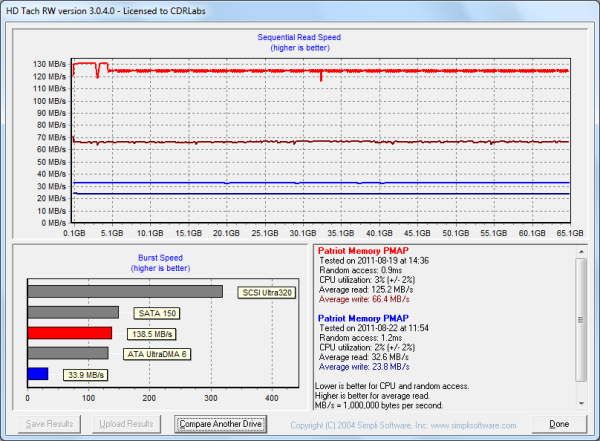
When connected to the computer's USB 3.0 port, the Supersonic had average read and write speeds of 125.2 MB/s and 66.4 MB/s, respectively, as well as a burst speed of 138.5 MB/s. As you'd expect, the drive wasn't nearly as fast when using USB 2.0. Compared to what we saw with USB 3.0, the Supersonic's read speed dropped by more than 90MB/s.
ATTO Disk Benchmark 2.46:
I also used ATTO Disk Benchmark to test the Supersonic's sequential read and write speeds. The test was run using blocks ranging in size from 0.5KB to 8192KB and the total length set to 256MB.
When tested with ATTO, the Supersonic's read speeds topped out at about 103 MB/s and its write speeds at 37 MB/s.
SiSoft Sandra File System Benchmark:
While I am not a big fan of SiSoftware Sandra's optical drive benchmarks, it is a great tool if you want to test a system's performance quickly and easily. One of Sandra's more useful tests is the File System benchmark. This benchmark gives each drive an overall score, or "Drive Index," based on the results of its read and write tests.
| Patriot Supersonic - USB 3.0 | Patriot Supersonic - USB 2.0 | Kingston DT Ultimate 3.0 G2 - USB 3.0 | Super Talent Express Duo - USB 3.0 |
|
| Drive Index: | 101.89 MB/s | 28.87 MB/s | 102.84 MB/s | 53.00 MB/s |
| Buffered Read: | 47.84 MB/s | 28.00 MB/s | 47.00 MB/s | 54.88 MB/s |
| Sequential Read: | 124.10 MB/s | 32.87 MB/s | 124.22 MB/s | 64.00 MB/s |
| Random Read: | 108.58 MB/s | 31.90 MB/s | 108.77 MB/s | 63.22 MB/s |
| Buffered Write: | 14.50 MB/s | 10.75 MB/s | 15.00 MB/s | 11.68 MB/s |
| Sequential Write: | 62.00 MB/s | 23.00 MB/s | 68.74 MB/s | 15.52 MB/s |
| Random Write: | 2.00 MB/s | 1.83 MB/s | 2.00 MB/s | 1.49 MB/s |
SiSoftware Sandra Removable Storage/Flash Devices Benchmark:
Designed with removable storage and flash devices in mind, this benchmark tests a drive's read, write and delete performance using six different file sizes (4kB, 64kB, 1MB, 16MB and 256MB). The results are then given in both operations per minute and the corresponding net transfer rate in MB/second. This benchmark also computes an "Endurance Factor," representing the wear and life expectancy of flash devices.
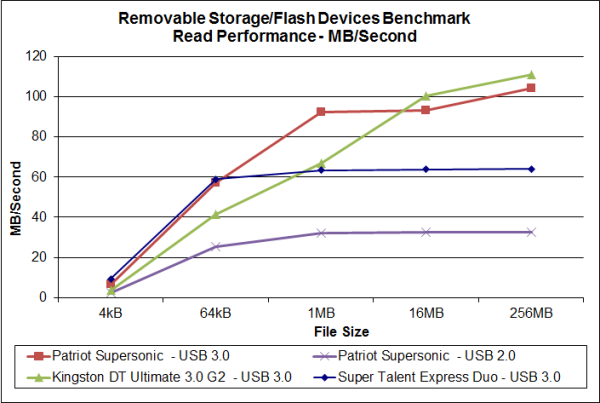
| Patriot Supersonic - USB 3.0 | Patriot Supersonic - USB 2.0 | Kingston DT Ultimate 3.0 G2 - USB 3.0 | Super Talent Express Duo - USB 3.0 |
|
| 4kB Read: | 6.74 MB/s | 2.55 MB/s | 3.90 MB/s | 9.33 MB/s |
| 64kB Read: | 57.00 MB/s | 25.24 MB/s | 41.55 MB/s | 59.00 MB/s |
| 1MB Read: | 92.40 MB/s | 32.15 MB/s | 66.76 MB/s | 63.43 MB/s |
| 16MB Read: | 93.00 MB/s | 32.60 MB/s | 100.56 MB/s | 63.82 MB/s |
| 256MB Read: | 104.13 MB/s | 32.73 MB/s | 111.00 MB/s | 64.00 MB/s |
The Supersonic was a little slower than the drive from Super Talent when reading 4kB and 64kB files. Nevertheless, it performed very well when reading larger files, reaching a maximum speed of 104.13 MB/s.
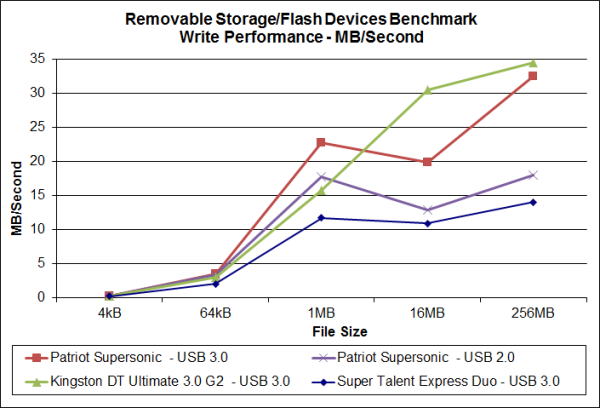
| Patriot Supersonic - USB 3.0 | Patriot Supersonic - USB 2.0 | Kingston DT Ultimate 3.0 G2 - USB 3.0 | Super Talent Express Duo - USB 3.0 |
|
| 4kB Write: | 0.238 MB/s | 0.249 MB/s | 0.210 MB/s | 0.200 MB/s |
| 64kB Write: | 3.48 MB/s | 3.29 MB/s | 3.00 MB/s | 2.00 MB/s |
| 1MB Write: | 22.71 MB/s | 17.78 MB/s | 15.74 MB/s | 11.70 MB/s |
| 16MB Write: | 19.87 MB/s | 12.82 MB/s | 30.56 MB/s | 10.86 MB/s |
| 256MB Write: | 32.48 MB/s | 18.00 MB/s | 34.53 MB/s | 14.00 MB/s |
The Supersonic also performed fairly well when writing. While there were a few cases where it lagged behind the drive from Kingston, it had a clear advantage when writing smaller files.
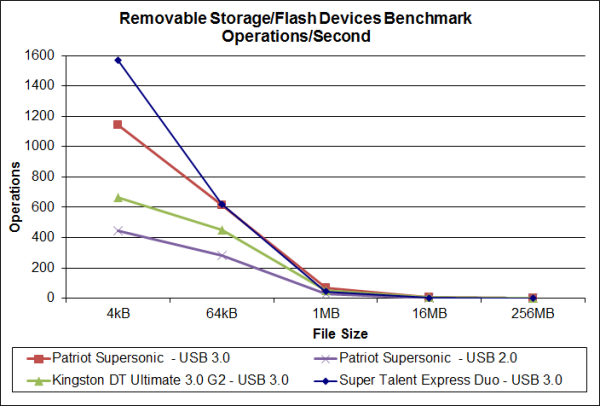
| Patriot Supersonic - USB 3.0 | Patriot Supersonic - USB 2.0 | Kingston DT Ultimate 3.0 G2 - USB 3.0 | Super Talent Express Duo - USB 3.0 |
|
| Combined Index: | 776.90 | 317.50 | 486.20 | 982.30 |
| 4kB Files Test: | 1141.00 | 446.10 | 666.60 | 1569.70 |
| 64kB Files Test: | 612.90 | 279.80 | 448.70 | 621.80 |
| 1MB Files Test: | 68.80 | 26.90 | 48.90 | 45.30 |
| 16MB Files Test: | 4.30 | 1.60 | 4.80 | 2.80 |
| 256MB Files Test: | 0.40 | 0.10 | 0.30 | 0.20 |
As I mentioned above, Sandra also expresses performance in operations per minute. To keep things simple, I've limited the results to the combined index and the total number of read/write/delete operations for each file size.
| Patriot Supersonic - USB 3.0 | Patriot Supersonic - USB 2.0 | Kingston DT Ultimate 3.0 G2 - USB 3.0 | Super Talent Express Duo - USB 3.0 |
|
| Endurance Factor: | 1.10 | 1.10 | 1.30 | 16.80 |
The Endurance Factor represents the wear and life expectancy of a flash device. According to SiSoft, this number is computed by "dividing the average performance (normal condition, i.e. sequential write) to the lowest performance (high-stress condition, i.e. same block re-write)."
"Real World" Benchmark:
To test the "real world" performance of Patriot's new flash drive, I copied and pasted 500 MB worth of randomly generated files and directories. All of the files are between 10 bytes and 32MB in size and no more than four directories deep.
| Patriot Supersonic - USB 3.0 | Patriot Supersonic - USB 2.0 | Kingston DT Ultimate 3.0 G2 - USB 3.0 | Super Talent Express Duo - USB 3.0 |
|
| Write: | 0:45 | 1:08 | 0:53 | 2:48 |
| Read: | 9 seconds | 20 seconds | 12 seconds | 13 seconds |
The Supersonic performed very well here, taking less than a minute to write our test data and a mere 9 seconds to read it back.
Final Thoughts:
The Supersonic is the first USB flash drive from Patriot to come through the 'Labs and to be honest, they could not have made a better first impression. Along with a compact, shock resistant design, this USB 3.0 flash drive packs some impressive performance. Thanks to its Quad-Channel technology, the Supersonic performed very well in our tests, reading at speeds as high as 125 MB/s and writing at 70 MB/s. This wasn't enough to top Kingston's new USB 3.0 flash drive. However, the Supersonic gave it a serious run for its money. My only real complaint is that the Supersonic's cap cannot be stored on the opposite end, which makes it easy to misplace when the drive is in use.
The Patriot Supersonic is available now in 32GB and 64GB capacities and can be purchased from online stores like Amazon for as little as $70.
Highs:
- Excellent read and write speeds
- Shock resistant up to 15Gs
- Backwards compatible with USB 2.0
- Well constructed
- Five year warranty
Lows:
- Cap cannot be placed on opposite end of drive
- Pricey



